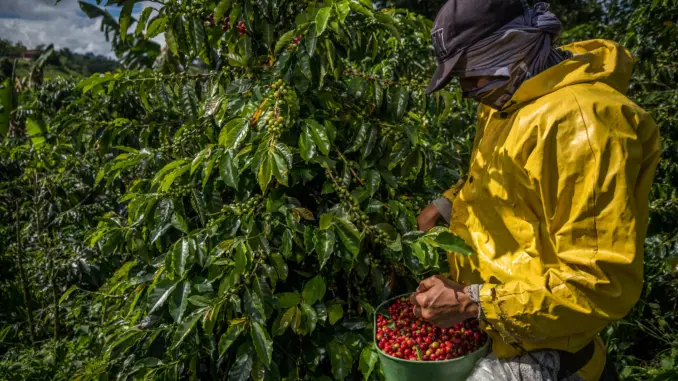
We continue our talk with Quinn Kepes, Verité’s senior program director, on strategies for minimizing labor risks in the coffee sector.
BY VASILEIA FANARIOTI
SENIOR ONLINE CORRESPONDENT
Photos courtesy of Quinn Kepes except where noted
Last week, we started a conversation with Quinn Kepes, senior program director in the Raw Materials Programs department at Verité. Quinn works on Verité’s COFFEE Project, funded by the U.S. Department of Labor, which aims to create cost-effective strategies for minimizing labor risks.
In the second part of our interview today, we will explore the results of the COFFEE Project so far, and how the project may impact the future of labor and human rights in the coffee sector.
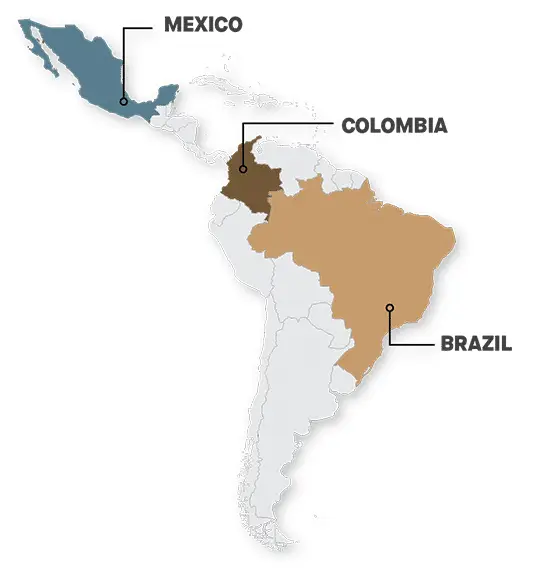
What can you tell us about the results of the COFFEE Project?
We have not yet completed the final evaluation, which will be published after the completion of the COFFEE Project at the end of March 2024, so we do not have a final assessment of project impacts. However, in general, I can say that we have created a set of 17 open-source tools and 10 online training modules that have been accessed and used by coffee producers, traders, and roasters to proactively identify, address, and prevent labor violations on coffee farms.
We have also successfully piloted projects to promote ethical recruitment practices in Brazil, improve worker incomes and well-being in Colombia, and build awareness and competencies related to labor issues among coffee companies, agronomists, field technicians, certification bodies, and government officials in Mexico. These pilot projects helped us to identify scalable, cost-effective approaches that are mutually beneficial to both workers and coffee farmers, and can thus be replicated in other countries and sectors.
How have these results been translated into tangible tools that can be used by businesses to address such issues?
We created the Socially Sustainable Sourcing Toolkit (S3T) through a process of robust stakeholder engagement and an innovative participatory tool development process, which has been documented in a guide published by the U.S. Department of Labor. The S3T is a comprehensive and detailed set of tools that help businesses and other stakeholders detect, prevent, and address labor violations in the coffee sector.
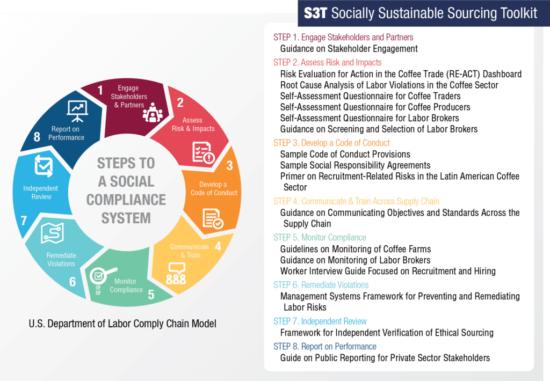
Among the tools is an online interactive Risk Evaluation for Action in the Coffee Trade (RE-ACT) Dashboard that helps users to proactively identify labor risks and their root causes in leading Latin American coffee-producing countries. The other tools are document-based and can be accessed online or printed out. These tools, along with a guidance document on definitions and international standards, are available in English, Spanish, and Portuguese.
How has the COFFEE Project changed or improved the situation with regards to human rights and labor abuses in coffee-producing countries?
The COFFEE Project seeks to develop open-source tools and training modules, and to pilot these resources and cost-effective approaches to improving labor conditions in Brazil, Colombia, and Mexico. As the project didn’t seek to measure the impact of our interventions on a country level, I can’t speak to country-level changes.
However, I can say that coffee producers, traders, and roasters now have access to free tools and training materials to increase their capacity to proactively and effectively identify, address, and prevent labor abuses on coffee farms. We have also identified cost-effective approaches to improve labor conditions in the coffee sector through our pilot projects, and will be publishing lessons learned from Brazil, Colombia, and Mexico in the coming months to promote the replication of these approaches.
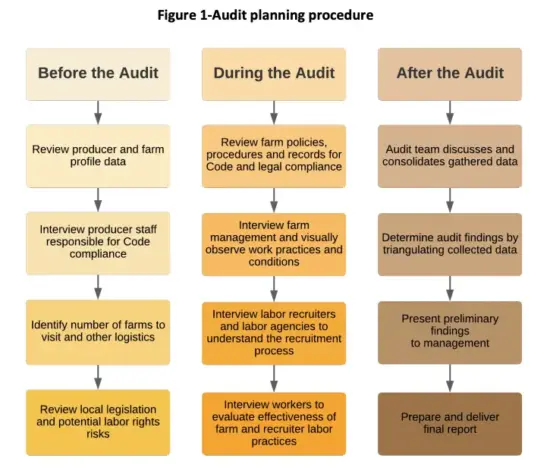
for labor risks among coffee sector workers.
How do you think this project is going to influence the future of labor and human rights in the coffee sector?
I believe that providing coffee producers, traders, and producers with tools and training modules will ensure that they have practical resources to effectively guide and align their efforts to improve labor conditions at the farm level. Our hope is that by identifying and piloting cost-effective approaches to improving working conditions that are mutually beneficial to workers and producers alike, we will be able to promote the scaling and replication of these approaches in other geographies.
What advice would you offer to companies wanting to take actionable steps to reduce labor and human rights abuses in their supply chains?
I would advise companies to explore the COFFEE Project website and to contact me or the project director, Antonio Rosa. Our contact information is available on the Get Involved section of the website.

What do you think are some of the biggest challenges facing the labor and human rights movement today?
On one hand, there has been an increase in attacks and criminalization of human rights offenders. On the other hand, many populations are becoming increasingly vulnerable to human and labor rights abuses due to climate change, forced displacement, conflict, violence, and political instability.
In terms of labor issues specifically, one of the biggest challenges is that farmers—especially smallholders—are generally the actors in the supply chain with the least resources and capacity to improve labor conditions. As commodity prices remain stubbornly and unrealistically low, price fluctuations and increases in the cost of key inputs—such as fertilizers—can push farmers to cut costs rather than to invest in improving wages and working conditions. Because labor is usually farmers’ largest expense, and the only one over which they have control, when prices fall, costs increase, or farmers face a crisis such as a crop illness or natural disaster, wages and working conditions often deteriorate.
Therefore, it is essential to identify win-win solutions to improving working conditions while also offering benefits to farmers. We have piloted ethical recruitment approaches that can result in increased efficiencies for farmers and protect them from legal and reputational risks in Brazil. In Colombia, we piloted harvesting techniques and tools to improve productivity and incomes, while decreasing ergonomic risks for workers paid by the pound of coffee harvested. This resulted in increased worker satisfaction and yields for farmers, and did not cost any more per pound of coffee harvested.
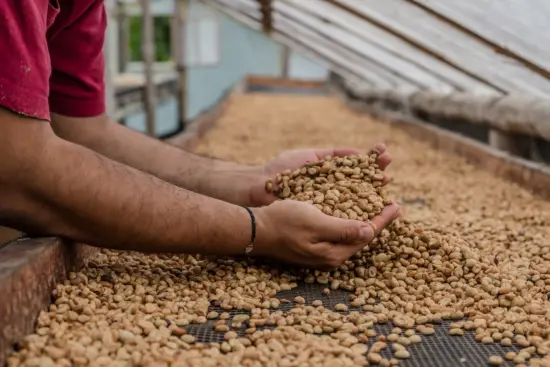
Improving wages, working conditions, and worker satisfaction is key to ensuring a stable supply of farmworkers. With increasing labor shortages in key coffee-producing countries, farmers are increasingly recognizing that coffee harvesters are not “low-skilled workers,” but instead irreplaceable “field baristas” who are essential to ensuring a steady supply of high-quality coffee. Therefore, it is key to the survival of the coffee sector that we identify scalable cost-effective models to improve working conditions in the sector.
What’s next for Verité in terms of tackling labor and human rights issues worldwide?
As I mentioned earlier, through the recently approved cost extension from the U.S. Department of Labor, the COFFEE Project will be developing a suite of tools specifically designed to meet the needs of smallholder farmers. Verité will identify the primary tools needed by smallholders and the ideal format of such tools through stakeholder dialogue and an expert committee that will also be responsible for helping to design and refine these tools.
The tools will subsequently be translated into Spanish and Portuguese, made publicly available on our website, and disseminated on the ground in Brazil. Furthermore, Verité will soon be publishing robust guidance and resources on human rights due diligence in the agricultural sector more broadly through the Farm Labor Due Diligence Initiative, funded by a coalition of leadership-level companies.
ABOUT THE AUTHOR
Vasileia Fanarioti (she/her) is a senior online correspondent for Barista Magazine and a freelance copywriter and editor with a primary focus on the coffee niche. She has also been a volunteer copywriter for the I’M NOT A BARISTA NPO, providing content to help educate people about baristas and their work. You can follow her adventures at thewanderingbean.net.

READ THE LATEST BARISTA MAGAZINE
Out now: It’s the August + September 2023 issue of Barista Magazine, featuring Boram Um of Brazil on the cover. Read it for free with our digital edition. Get your Barista Magazine delivered; start a subscription today! Visit our online store to renew your subscription or order back issues.

